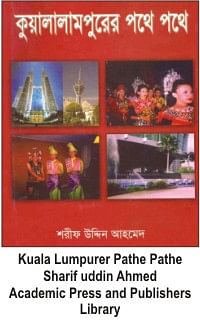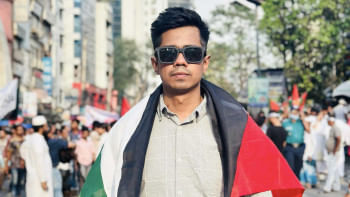Not the casuarina tree

AS travelogues go, Kuala Lumpurer Pathe Pathe is rather humdrum. As a book that highlights the importance of archives to a nation or country, however, Sharif uddin Ahmed's work carries some weight, an aspect that should have a far greater impact on the people and government of Bangladesh than its contents in one hundred pages and small change. According to The New American Desk Encyclopedia, archives, which are documents of a public body preserved in an organized manner, began in 1789 with the French Archives Nationales as the systematic collection and supervision by a central government agency. Quoting the director general of the Malaysian National Archives, Ahmed brings out the significance of archives to a society: "Archives are not only important for heritage preservation but also as means of transparency in a government…. They can be the reference to our past strengths and weaknesses, and guide us to move forward…." However, the author laments, there is little public awareness in Bangladesh about the important role that archives can play in a country's development.
The book under review grew out of Sharif uddin Ahmed and a team from Bangladesh (which also included a Dutch member, Florus Geraedts) that attended the International Council on Archives' (ICA) 16th International Congress on Archives in Kuala Lumpur, Malaysia, in July 2008. The primary goal of ICA is to help preserve the cultural heritage of nations throughout the world. I must confess that I had taken up the book in anticipation of going through a travelogue of people and places, sights and sounds, above all, the idiosyncrasies and distinctiveness that make the Malaysian a Malaysian, and looking for human stories that attract or repel (often the two represent a similar emotion under different circumstances), that fascinate and leave an indelible imprint on ones mind. I have not found them, at least not to the extent of making them memorable, not even the sketchy and spotty accounts of the plight of migrant Bangladeshi workers in Malaysia. The nine days that the author spent in that country are taken up, in addition to terse details of the conference proceedings, mostly by narratives of food, more food, and still more food dished up during the meeting days and special visits (although, strangely, there is not much detail of specific Malaysian cuisine that were served up), and at a restaurant with a Bangladeshi waiter, shopping, and the many travails of departure from, and arrival in, Bangladesh and Malaysia. Not much of the exotic, and nothing of the romantic, in Malaysia, comes through in the book.
Kuala Lumpurer Pathe Pathe does, however, bring any romantically-inclined reader, especially one from Bangladesh, down to earth with sobering thoughts on the imperative of meticulously gathering and preserving archival materials. The author states his primary objective in attending the conference as getting ideas from its proceedings and Malaysia's experience in archival management for implementing an effective plan of action along that line in Bangladesh. At one point, he notes that, whereas only a few short decades back, Malaysian National Archives officials used to be trained at the Indian National Archives in New Delhi, these days they are the ones to provide training to archivists worldwide. Simultaneously with his professional interest (Ahmed is a Professor of History at Dhaka University and a former Director of Archives and Public Library of the Government of Bangladesh), the author also sought to find meaningful solutions to how Kuala Lumpur has turned into one of the most beautiful cities in the world, while Dhaka is beset with multifarious problems. He might have found an answer in his own observation on how, on observing Dhaka from the air at night, he found it to be enchanting under the lights. He was looking at an illusion, flattering to deceive!
The conference was suitably impressive with 1200 delegates from 138 countries having descended on the Malaysian capital "to discuss the challenges confronting the profession and to set a trend for the new millennium." 300 of the delegates presented papers on the theme of "Archives, Governance and Development: Mapping Future Society" in order to stress on the importance of collecting and preserving archival materials as one tool for ensuring good governance. The author was satisfied with the overall quality manifested at the conference. In line with the major objectives of ICA and the conference, Ahmed offers some cogent thoughts on the rather poor state of archival management, in spite of a few stellar individual efforts, in Bangladesh. He perceives a general lack of awareness among the people on the importance of archives. Such lamentable paucity is not just confined to the general citizenry; it is also present in government circles, intellectuals, and people in important institutions like the judicial system. This factor has been a crucial impediment to the development and flourishing of archives in this country.
Such a lackadaisical attitude has contributed to the disastrous outcomes of, on the one hand, record management and preservation suffering damage, and, on the other, old documents suffering from neglect or even destruction. The cumulative consequence has been the erosion and destruction of our culture, heritage, and history. Ahmed suggests creating awareness about the necessity of preserving archives among the general citizenry as a fundamental step towards improving the unsatisfactory situation in the country.
The book offers tidbits of observation that are interesting as well as instructive. One is that, in Malaysia, although a Muslim majority country, women enjoy considerable freedom of movement, at par with men. Another is poignant. On a short official visit to Malacca (now having reverted to its ancient name of "Melaka"), he found that the local youths would often behave badly with, even to the extent of resorting to physical attacks on, the immigrant Bangladeshi workers living there. Some things, like ethnocentrism and its unpleasant manifestations, may be found all across the globe! Kuala Lumpurer Pathe Pathe will have served an important cause if it can spread the message of awareness in the people on the need to gather and preserve archival material of Bangladesh.

 For all latest news, follow The Daily Star's Google News channel.
For all latest news, follow The Daily Star's Google News channel. 



Comments